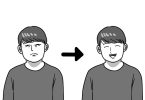Have you ever wondered what makes a person become a narcissist? You know, those people who can’t get enough of themselves. Well, you’re in the right place. Here, we delve into the realm of narcissism, examining what leads someone to become the focal point of their own universe.
1. Childhood experiences.
You know how our experiences when we were kids shaped who we are today, right? Well, it’s the same with narcissism. When children grow up feeling neglected or mistreated, they might develop narcissistic tendencies to protect themselves from their past pain and insecurity. It’s like a defense mechanism to focus on themselves and create a shield. But guess what, it’s not just neglect that can lead to narcissism. Kids who get excessive praise without learning the value of hard work might start thinking they’re the best in the world. They feel entitled to special treatment because they believe they’re superior. Contrastingly, constant criticism without positive feedback can also affect a child’s self-esteem. They might crave attention and validation to compensate, which can turn into narcissistic tendencies.
Read More: What The Narcissist Does When You Go No Contact.
2. Genetics.
Imagine genetics is the recipe that makes you who you are. Do you know how you get your physical traits from your parents, like eye color or height? Well, you might also inherit certain personality traits from them. Studies have found that if someone in your family has narcissistic traits, there’s a higher chance you might display similar behaviors. It’s like a little family pattern that shows up. Here’s an incredible theory to explain the link between genes and narcissism. So, those specific genes that make us impulsive or risk-takers, while they might also be responsible for giving rise to narcissistic tendencies. They’re having a little party together in our genetic code.
A Book: Why Does He Do That?: Inside the Minds of Angry and Controlling Men.
3. Personality traits.
Personality traits play a significant role in making someone become a narcissist, and it’s not just about narcissism. Our characteristics influence many aspects of our lives. When someone has low self-esteem, they feel shaky and unsure about themselves. They don’t believe in their awesomeness, and that’s when they start seeking approval from others. They want to make up for feeling inadequate, so they start putting the spotlight on themselves and their achievements. And that’s when those sneaky narcissistic tendencies creep in. They get all obsessed with themselves and their accomplishments and need everyone to keep showering them with praise and admiration. They can’t feel good about themselves unless others are patting their backs. But hold on, there’s more to the story.
Related: 5 Sadistic Things Narcissists Find Entertaining.
Insecure people are also at risk of developing narcissistic traits. They’re always on the hunt for attention and validation. Because deep down, they don’t think they deserve love and respect unless they’re constantly in the limelight. It’s like they’re begging for reassurance all the time.
4. Social and cultural factors.
Psychologist Jean Twenge talks about the rise of narcissism among young people, and she links it to the boom in social media use. Constantly seeking attention and admiration from others can create a need for constant validation, making us more prone to narcissistic traits. Cultural factors also come into play. In some cultures, there’s a strong emphasis on individual achievement and success. This intense focus on personal accomplishments and status-seeking can put a lot of pressure on people to constantly strive for recognition and success. As experts point out, these cultural norms can unfortunately fuel the development of narcissistic tendencies. When success and achievement become the ultimate measure of worth, individuals might become excessively self-centered and prioritize their desires over others.
Related: These Are 8 Demonic Spirits Behind Narcissism.
5. Trauma.
Trauma is one of the reasons why some people turn into narcissists. Trauma can be tough to deal with; it’s like going through something hard or losing something important. When people face such overwhelming experiences, it can mess with their emotions. Now, imagine someone going through trauma. They might feel insecure and desperate for some control in their life, so they might focus too much on themselves to cope with these overwhelming feelings of vulnerability. They develop this insatiable craving for attention and admiration. They want to be the center of the universe because it makes them feel less powerless.
Recommended: Healing from Hidden Abuse: A Journey Through the Stages of Recovery from Psychological Abuse.
6. Power and success.
According to psychologists and experts, when someone becomes successful, they may show some narcissistic traits. But success isn’t the culprit here; the fancy environment comes with it. When you’re successful, everyone’s like, “Wow, you’re amazing!” and showers you with attention, admiration, and praise. And guess what? All this positive stuff can create a feedback loop that makes them even more self-centered. Dr. Brad Bushman, this big-shot psychologist, explains that constant validation and adoration can make people feel superior to others, and that’s when the sense of entitlement kicks in. They start thinking they deserve special treatment just because they’re successful and influential. You know the saying, “With great power comes great responsibility.” Well, in the case of narcissism, it’s more like, “With great power comes even greater potential for narcissism.”
Read More: 9 Demeaning Things Narcissists Say.
7. Environmental factors.
Experts in psychology and psychiatry have been looking into how our environment can shape these narcissistic tendencies in people. One significant factor is our competitive world, especially in certain professions. You know those industries where success and being the best are highly valued, and everyone’s trying to outdo each other? Growing up or working in such a cutthroat environment can lead individuals to develop a strong desire for validation and recognition.
An incredible theory suggests that when people become overly obsessed with promoting themselves and putting others down, their narcissistic tendencies can worsen. Hold on, there’s another twist to this story. Exposure to toxic environments, like abuse, neglect, or trauma, can lead some people to develop narcissistic behaviors. It’s like a defense mechanism for them. They feel superior and untouchable, using that as a shield to protect themselves emotionally from harm others might cause.
8. Histrionic personality disorder.
A histrionic personality disorder is a psychological condition where a person has a strong desire to be noticed and get attention from others. They may go to great lengths to capture the spotlight and impress people around them. Some experts believe there could be a link between histrionic personality disorder and narcissism. You see, narcissism is another personality disorder characterized by an inflated sense of self-importance and an intense need for admiration. As psychologist Dr. Craig Malkin puts it, narcissism can develop as a way to feel more in control or compensate for feelings of powerlessness.
For More: 7 Traits of a Person Who Has an Evil Heart.
9. Borderline personality disorder.
Borderline personality disorder (BPD) is a mental health condition that affects how a person thinks and feels about themselves and others, often leading to intense and unstable relationships. Some experts have proposed a link between borderline personality disorder and the development of narcissism in some instances. The theory goes something like this: When someone with BPD experiences intense emotions and struggles with unstable relationships, they might develop defense mechanisms to cope. One of these defense mechanisms could be narcissism. The idea is that they might adopt narcissistic traits to protect themselves from the emotional pain and vulnerability they feel.
Related: 10 Facts About BPD No One Talks About | Borderline Personality Disorder.
10. Antisocial personality disorder.
People with ASPD may have trouble forming meaningful emotional connections with others. They might not care about the consequences of their actions on those around them. Experts believe that narcissistic traits could be a coping mechanism for someone with ASPD. By building up a grandiose self-image and seeking constant admiration, they might be trying to protect themselves from feelings of worthlessness or emptiness they might experience due to their lack of empathy and emotional connection with others.
Recommended Book: Becoming the Narcissist’s Nightmare: How to Devalue and Discard the Narcissist While Supplying Yourself- By Shahida Arabi.
Awareness is key. Recognizing the signs early on can help curb narcissistic tendencies before they get out of hand. And remember, a little bit of self-love and confidence is all right. So the next time you encounter someone with narcissism, remember, it’s not all black and white. Life is a colorful blend of influences, experiences, and choices. Stay curious and empathetic. If you’re interested in narcissism-related topics, why not check out this website here? You might find it informative.
Read More: 6 Weird Habits of a Covert Narcissist.
Sharing Is Caring!





